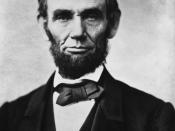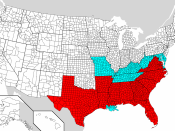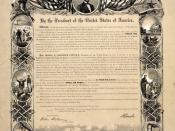Lincoln's Emancipation Proclamation
The Emancipation Proclamation was issued on September 22, 1862. The author, President Abraham Lincoln, stated that the proclamation declared all slaves held within states of rebellion against the United States government be freed on January 1, 1863. On July 2, 1862 a preliminary draft was read to Lincoln's cabinet members. The final and explicit draft of the emancipation proclamation, issued January 1, 1863, took the United and Confederate states by storm.
At the beginning of the Civil War, Lincoln was very hesitant on issuing any decision on freeing slaves. Abolitionists and protesters of slavery constantly urged Lincoln to emancipate slaves in the Confederate South. Lincoln truly believed that the only reason the Civil War was being fought was to preserve the Union. He wanted no part in pushing away the slaveholding Border States that had remained faithful to the Union during the war. He wanted to have more support from the American public before he made any drastic decisions on the matter.
His cabinet and other politically influential people frequently criticized Lincoln for not taking action on the slavery issue. In a letter to friend and New York Tribune founder Horace Greeley, Lincoln wrote "If I could save the Union without freeing any slave, I would do it; and if I could save it by freeing all the slaves, I would do it; and if I could do it by freeing some and leaving others alone, I would also do that." After the approval of the Second Confiscation Act, which freed slaves of all rebellious states, Lincoln had the public backing he needed to create an emancipation proclamation. On July 13, 1862, he revealed his plan to his Secretary of State, William H. Seward. Seward feared anarchy and uprising in the South and thus Seward suggested...


